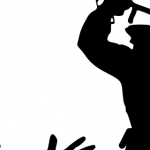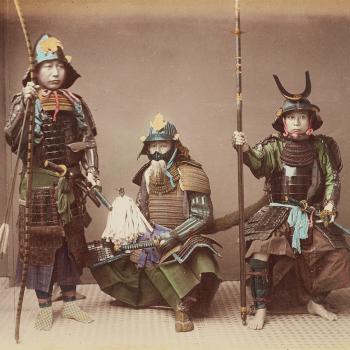Omar Mateen, who killed 49 people at the gay nightclub Pulse in Orlando on Sunday morning, was apparently a wannabe cop with an aggressive demeanor and a history of domestic violence. (Echoes here of George Zimmerman. Maybe if we took domestic violence more seriously we’d have put both these killers under supervision before it was too late.) After his wife left him he became seemed to become more religious, though apparently not in a way that actually impressed the core tenants of Islam on him.
His father says that the shooting had nothing to do with religion and that Mateen had developed an outrage about homosexuality after seeing two men kiss in public. But his father seems to have a tenuous grip on reality, posting incoherent videos about Afghani politics and praising the Taliban. So we may have an unreliable witness there.
One former co-worker describes Mateen as “unhinged and unstable”, and says he “talked of killing people”; another said, “He had bad things to say about everybody—blacks, Jews, gays, a lot of politicians, our soldiers. He had a lot of hate in him. He told me America destroyed Afghanistan.”
He laughed as he murdered forty-nine people Sunday morning. Before he was killed, he told police he was a follower of the “Islamic State” a organization known for massacring the innocent.
Had someone in the club managed to shoot him or stab him or club him down or do other horrible things to his body to try to stop his rampage, we would be hailing that person as a hero. We naturally and rightly feel a willingness to destroy him.
That’s one story about what happened Sunday morning in Orlando. And it’s a true story. And our sorrow for the victims and our wrath for the perpetrator are both righteous.

But this also is true:
Omar Mateen was apparently himself a repressed gay man, torn between the expectations of his family and ancestral culture and his own feelings. He used the gay dating app “Jack’d” and made at least a dozen visits to Pulse before the attack, becoming drunkenly belligerent on a few occasions — rather as we might expect someone torn between two powerful drives to do.
He asked a male classmate out on a date and was turned down; that classmate says that others felt sorry for him, that “He just wanted to fit in and no one liked him…He was always socially awkward.” A decade ago he was friendly with a drag queen and his lesbian co-workers; I can picture a young man just a few years out of high school, starting to explore gay culture, wondering if it was for him.
But that didn’t go over well. His ex-wife reports that his father denounced him in front of her for being gay.
She also reports that he was bipolar (though that is apparently an informal, lay diagnosis) and had a history of steroid use. Steroid use is five times more common among gay and bi male teens than among their straight peers, and it’s widely believed that this pattern continues into adulthood in part due to body image and hyper-masculinity issues within gay culture. Such use has been linked to mood disorders and aggression, though as always it’s hard to tell the direction of causality. (“I’m depressed, maybe putting on pounds of muscle and getting ripped would help me feel better about myself. Or maybe punching someone out would help me feel powerful.”)
When Mateen claimed to ally himself with the “Islamic State”, he also said that he was a member of Hezbollah — which is an enemy of the “Islamic State”, on the other side of the Sunni/Shia divide. It’s as if his actions weren’t driven by Islamist extremism but at the end of his life he felt compelled to make some horribly confused and mistaken gesture of identification with his ancestral culture.
So this is also a true story.
If we heard this story about someone who hadn’t committed one of the worst mass murders in American history, we might find our hearts moved in sympathy with someone so torn. Even if that person had committed lesser crimes of violence, we might condemn some of their actions while understanding the confusion and pain in which they were rooted. We might even see someone we wanted to help.
Moved by such a story, we might resolve to reach out to LGBT youth to make sure they have the social support they need to explore their own natures and find their way in the world, with a special focus on those coming from immigrant families from conservative cultures. We might consider that when someone speaks hatefully about others they are often speaking from a place of pain, and might try — as hard as it is — to not rise to the hate and instead to look for the pain.
We might even try — a nearly impossible task, but we might try anyway — to apply that here, to look for the pain that drove Mateen’s actions. And even as we mourn the murdered and try to help the survivors, we might mourn also for Mateen, for that young man laughing with the drag queen and the lesbian bartenders; mourn for a life that could have been, under different circumstances.
Of course, we won’t do that. There’s too much blood and too much anger. We’ll whip up more fear and suspicion again each other. One side of the partisan divide will rail against Muslims and immigrants and maybe even say that Mateen’s actions show gay men are a danger, and the other will rail against gun owners and demand more censorship of “hate speech” and maybe even say that Mateen’s actions show Islam is a danger.
Unwilling and unable to make the changes in human relationships that might reduce the chances of this happening again, we’ll demand the state take highly visible but ultimately ineffective steps to protect us (“security theater”), and we’ll authorize more surveillance of each other — and never mind that Mateen had already been investigated by the FBI twice, that when everyone (or at least every Muslim) is a suspect there’s no way to sort out the true threats.
A toxic cultural combination sent one man into his own hell, and on Sunday morning he reached out and pulled over a hundred people into the center of it with him. Hundreds more — the families and friends of those killed and wounded — were yanked into rings of that hell.
And now, in fear and mistrust, the whole nation is poised to jump in after him.
On a lighter note, I’ll be at the Free Spirit Gathering this weekend, helping focalize the ritual aspects of the Fire Circle Friday and Saturday night, and performing music Saturday afternoon at lunchtime. And I’ll be presenting at the Starwood Festival this July.
You can keep up with “The Zen Pagan” by subscribing via RSS or e-mail.
If you do Facebook, you might choose to join a group on “Zen Paganism” I’ve set up there. And don’t forget to “like” Patheos Pagan and/or The Zen Pagan over there, too.

















